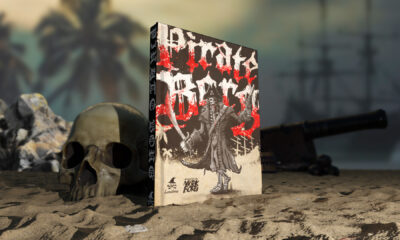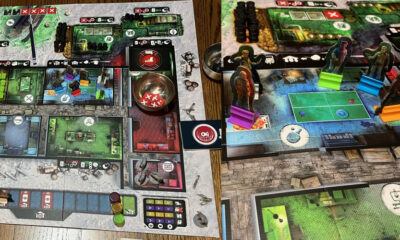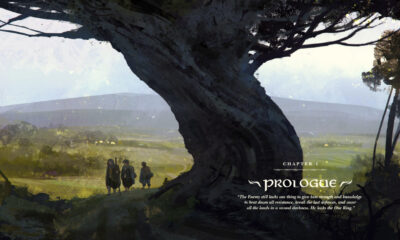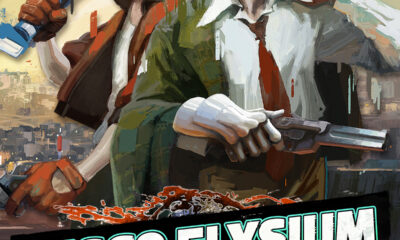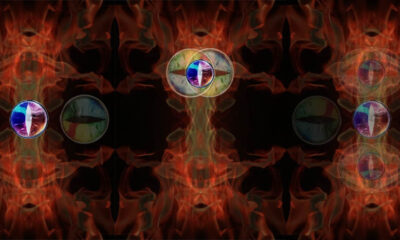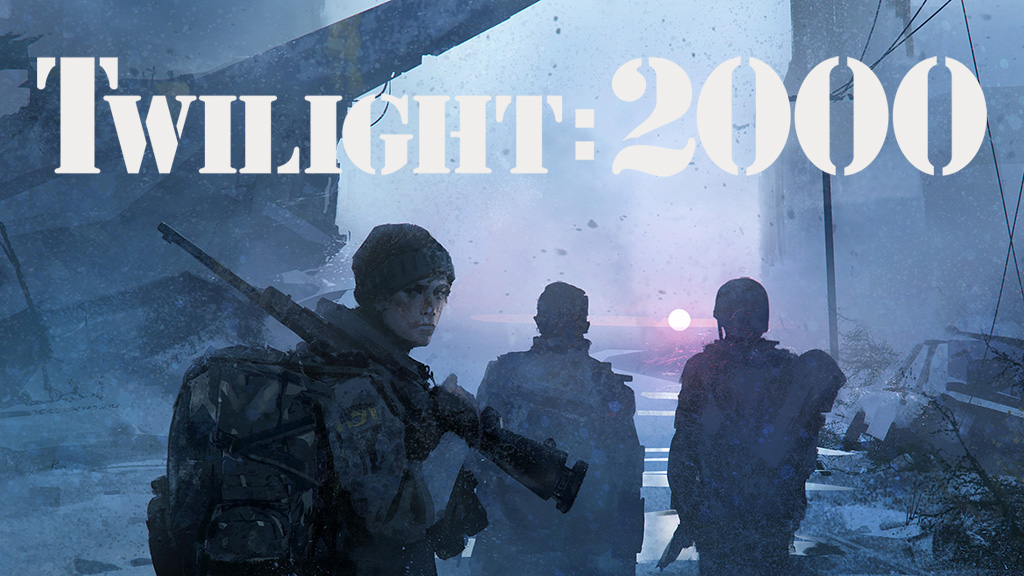
When You’re Going Through Hell, Twilight 2000 RPG Campaign Log: Characters @FreeLeaguePub
More Videos
Published
2 years agoon

Welcome to When You’re Going Through Hell, our Twilight 2000 RPG campaign log. Last time on War Is Hell, I started a review of Free League Publishing’s Twilight 2000 RPG; this series will expand upon that. Here is a chance to meet the motley crew that we rolled up using the Life Paths character generation system which I really liked. I’m not going to detail all of their stats but you get the idea from the backstories. So, without further ado…
Meet Our Crew
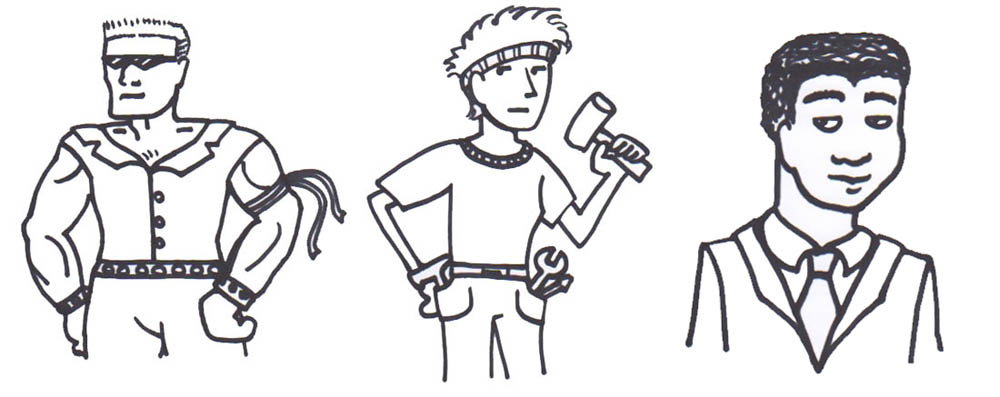
Kyle Van Schoen (Ice) as written and played by myself
Kyle Van Schoen is an American machine gunner. Kyle grew up in a wealthy family in the suburbs of Los Angeles, CA, USA. He learned Russian as a child to engage with his matriarchal grandmother who ruled the roost. And he went to college as expected. But he really wanted to do something more physical developing his strength. In college studying science, Kyle took up wrestling which became his passion. He developed a name for himself in the wrestling circuit while specializing in chemistry, and this attracted the attention of an influential gang expanding their meth market. The gang welcomed him as family and rewarded his physical prowess in ways his family never acknowledged. When close friend and gang leader Moondog, the brainiac of the operation so to speak, was shot by a rival gang in a bloody spectacle, the police became involved and quickly swept up the remaining gang members. Through his grandmother’s clout, Kyle was offered opportunity to join the Army to fight in the war in Europe rather than being hauled off to jail, court and prison, which would have smeared his birth family’s reputation. His incredible strength quickly cast him as a machine gunner. He nicknames his comrades under the premise that you should never reveal your true self because you don’t know who is listening.
Moral Code (quoted from Mal in Firefly, Serenity): I look out for me and mine.
Big Dream: He secretly wants to be reunited with his gang family and return to the streets of LA.
Nadya Wojcik (Nadi, nicknamed Wheelz by Kyle) as written and played by myself
Nadya Wojcik was born in Milicz to a Polish father and French mother and is much more at home under the hood of a car than engaging socially. Nadya was an only child, raised by her father after her mother died when she was only 3 years old. She took on her father’s affinity for cars and helped him out in the garage from an early age. As she gained skills as a mechanic, she became fascinated with how things worked and dabbled in gunsmithing, locksmithing, blacksmithing and finally improvised munitions as the world began to fall into upheaval. Her father was killed and their garage was destroyed when the Russians took over Milicz, and Nadya fled the city in her pickup truck. She began to learn some quartermaster skills, developing her ability to set up camp wherever she went looking for work, until she was recruited by the US Army to help with vehicle repairs after losing most of its internal logistical support.
Moral code: Fix it right the first time dammit!
Big Dream: To someday set up an auto body shop in her father’s memory.
Roger Smith (nicknamed Maestro by Kyle) as written and played by myself
Roger Smith is an African-American 1st lieutenant who comes across as a very courteous and polished man of impeccable moral character. Roger grew up in small town Alabama in the US and enjoyed deer hunting every season with his cousins, learning to handle a rifle on their isolated property away from judgmental eyes. He had wanted to make a name for himself in rock-n-roll but, in college, he soon realized that his dream of becoming a big name musician was out of reach – he was just too clean-cut for the popular scene at the time. So he went into the military to find another way to get out of the small town. His musical background and liberal arts education led him to want to inspire others and he quickly wound up on the officers’ track. Although he had only spent two terms in the military before the war broke out, he excelled at tactical training and was named a 1st lieutenant before being sent to Europe.
Moral Code: We’re all in this together.
Big Dream: To fulfill his duty to his country and then return home to his family having seen what is left of this decaying world.
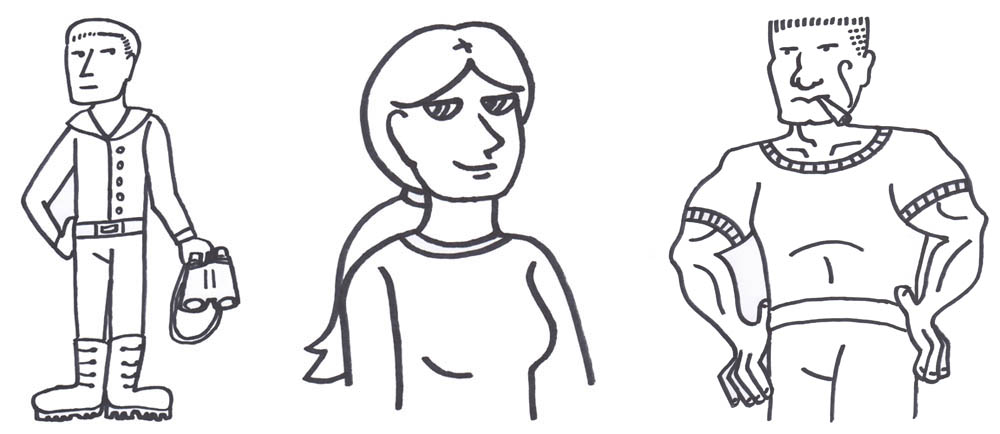
Aleksy Sowka (Alek, nicknamed Scope by Kyle) as written & played by V
Aleksy (means defender of man) Sowka (means owl), Alek’s grandfather grew up in Poland. He liked to go hunting with his father. When he turned 12, his father told him he was to hunt on his own, as a rite of passage. When he was on his way home, with 3 small rabbits, he saw militants in his village. They were burning houses, killing adults and rounding up children to be sold as sex slaves. He saw his sister being raped by militants. Knowing he couldn’t change the situation, he used his rifle to shoot her in the head so she would be spared the horrors to come. Afterwards, he scavenged the village for money and supplies and made his way to the United States.
Alek grew up in a military family. His father was a Non-Com officer and ruled with an iron – but not abusive – hand. His father taught him to hunt and told him the story about his grandfather many times. Alek enjoyed using a rifle and became adept at hunting. He also learned the art of stealth, and was all that more successful because of it. He day-dreamed about saving innocent people from oppression and being the hero in a movie. As soon as he could, he enlisted in the military and thrived under the structure and discipline which accompanied military life. He eagerly learned as much as he could about ranged combat, scoped weapons, stealth, recon and combat awareness. He went into special ops as soon as he qualified. Now, as 1st Sergeant at the age of 33, he learned medical aid and command training. He was even second in command in the aftermath of a nuclear strike so has a working knowledge of radiation sickness.
Moral Code (a quote from Mahatma Gandhi): “Though violence is not lawful, when it is offered in self-defense or for defense of the defenseless, it is an act of bravery far better than cowardly submission.”
Big Dream: An idealist, he wishes to live in a community without oppression.
Patricia Smith (Trisha, nicknamed Doc by Kyle) as written & played by V
“Trisha” grew up in rural Kentucky. Her father was a farrier – a trained specialist who cares for horse’s feet. It combines the skills of blacksmith and veterinarian to trim and balance horses’ hooves, craft & maintain horseshoes and apply them to horses’ feet. Her mother was a home health aide. As a child, she loved to go with her father around the countryside. Initially, she wanted to be a veterinarian for horses. But then her father developed the tremors and shuffling gait of Parkinson’s disease. The area was so rural that there wasn’t a doctor for 200 miles. So she watched her father deteriorate. He died when she was 17. When she graduated from high school, she made a promise to herself that she would become a rural doctor. In college, she developed a fascination for and proficiency with chemicals… and discovered she threw up when she saw blood. Realizing this would make being a general practitioner difficult, she revised her goal. She decided to go into research. No blood there! But getting there would be a challenge. First, she had to earn her way up the ladder of skills – field surgeon, treating diseases, chemical poisons and antidotes, radiation sickness, etc. To her dismay, just as she was applying for that research position at John’s Hopkins University, she was drafted.
Moral Code: 1st – Don’t throw up. 2nd – Do no harm.
Big Dream: To find a cure for Parkinson’s Disease and be lead researcher at John’s Hopkins University.
Jack Max (nicknamed Brick by Kyle) as written & played by V
Jack grew up in a small house in urban Detroit. Both of his parents worked in the automobile factory and made a decent living. Jack had a little sister, 2 years younger than he. His father frequently became drunk. And when that happened, he was abusive to Jack, his sister and his mother. Jack became fiercely protective of his mother and sister, and would antagonize his father to distract him from hurting them. Unknown to him, Jack’s sister started using drugs. When she was 16, she died from an overdose of heroin. Not able to deal with the trauma of her daughter’s death, Jack’s mother hanged herself. When he graduated from high school, he was hired by a construction company and learned many useful skills. He had a good work ethic and developed an aversion to alcohol and drugs. He also became adept at scrounging for parts to fix things around his house. His short stature, however, resulted in him being bullied and picked-on by the older workers. He had to quickly learn to defend himself and gain the upper hand in order to avoid injury, or worse. Out of necessity, he developed skills in all methods of combat. Soon, his first reaction was to fight. He definitely was not a team player. With the money he earned and the skills he learned, he developed a side job fixing houses for others in the neighborhood.
When he was 25, he heard about the military’s need for recruits due to the increasingly precarious situation in Eastern Europe. Rather than getting drafted, Jack enlisted. He liked the idea of getting to fight and not get into trouble for it!
Moral Code: Every man for himself.
Big Dream: Not to have to rely on ANYBODY.
Jennifer Weigel is a multi-disciplinary mixed media conceptual artist residing in Kansas USA. Weigel utilizes a wide range of media to convey her ideas, including assemblage, drawing, fibers, installation, jewelry, painting, performance, photography, sculpture, video and writing. You can find more of her work at: https://www.jenniferweigelart.com/ https://www.jenniferweigelprojects.com/ https://jenniferweigelwords.wordpress.com/

You may like
-
Dive into Adventure: A Comprehensive Review of the Pirate Borg RPG
-
The Thing in Review, Movie 1, Movie 2 and the Board Game
-
Heroic Adventures Await: An Epic Review of The One Ring Starter Set
-
Disco Elysium – A Reflection
-
Dune – Adventures in the Imperium: Gen Con Review
-
Ppppfffftttt, an RPG story by Jennifer Weigel
Gaming
Stygian: Reign of the Old Ones (2019), a Game Review
Stygian: Reign of the Old Ones (2019) is a tactical role-playing video game developed by Cultic Games, evoking Lovecraftian horror.
Published
3 months agoon
April 30, 2024
Stygian: Reign of the Old Ones (2019) is a tactical role-playing video game developed by Cultic Games, evoking Lovecraftian and cosmic horror. Published by Fulqrum Publishing, this game is available through Linux, macOS, and Windows. This review will cover the $19.99 Steam release.
The Great Old Ones have awakened, exiling Arkham after the events of Black Day. Design your character and face the abominations of Arkham. Explore the 1920s through a Lovecraftian aesthetic as you unravel the secrets that plague Arkham, facing unknowable cosmic horror and malicious abominations.
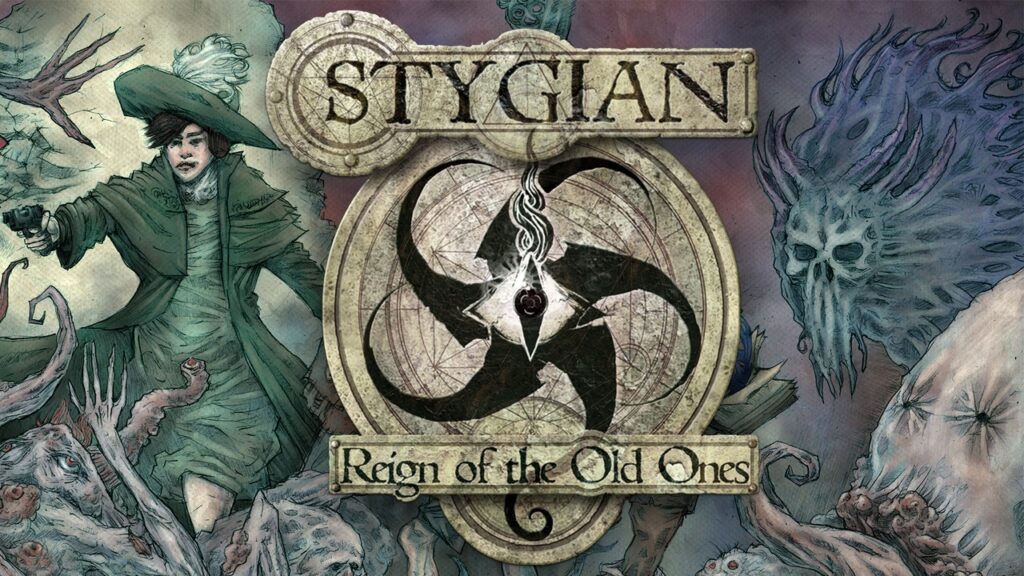
What I Like Stygian: Reign of the Old Ones
The depth of character creation starts the game off on the right foot. While appearance has various options, the game provides greater variety in motives, age, and origins, adding different gameplay elements. For example, age reflects lived experience and physical competency. The younger your character, the less experienced but more physically capable. This dynamic requires trial and error to find the best choice for you.
The paper cutout art provides a unique interpretation of a familiar (but stylish) Lovecraftian aesthetic. While not the most haunting execution of the Lovecraftian, it still manages to unsettle and unnerve while maintaining visual interest. That said, if the style doesn’t suit the player’s taste, Stygian: Reign of the Old Ones might leave that player wanting.
While I find the story engaging and the mysteries worth exploring, there’s a massive caveat to that claim. Regardless, if you fancy the Lovecraftian, few care as deeply and express as much knowledge of the genre as Cultic Games in this installment. This love and knowledge shines through in the often subtle allusions and references to the expanded universe. It may earn its place as the most Lovecraftian game out there.
The characters vary in interest and likability, but there’s usually something about them to add to the overall mystery. Naturally, this remains most evident in the companions that accompany the player on their journey.
In terms of horror, Stygian: Reign of the Old Ones achieves notable success. Despite the subjective points of aesthetics, the game brings out the most unsettling and uncomfortable elements of Lovecraftian and cosmic horror.

Tropes, Triggers, and Considerations
With an understanding of the Lovecraftian comes the question of how to deal with racism. Most properties try to remove this context, but Stygian: Reign of the Old Ones recognizes the text and era (the 1920s) with caricatures such as a lunatic in blackface. I won’t say it fully explores these toxic elements, but it’s not painted in a positive light.
Insanity and mental illness play a large role in the mechanics of the game, such as becoming a key component of casting spells. Loosely related, drug addiction and usage are mechanics with varying degrees of necessity depending on your build.
If these are deal breakers, perhaps give Stygian: Reign of the Old Ones a skip.
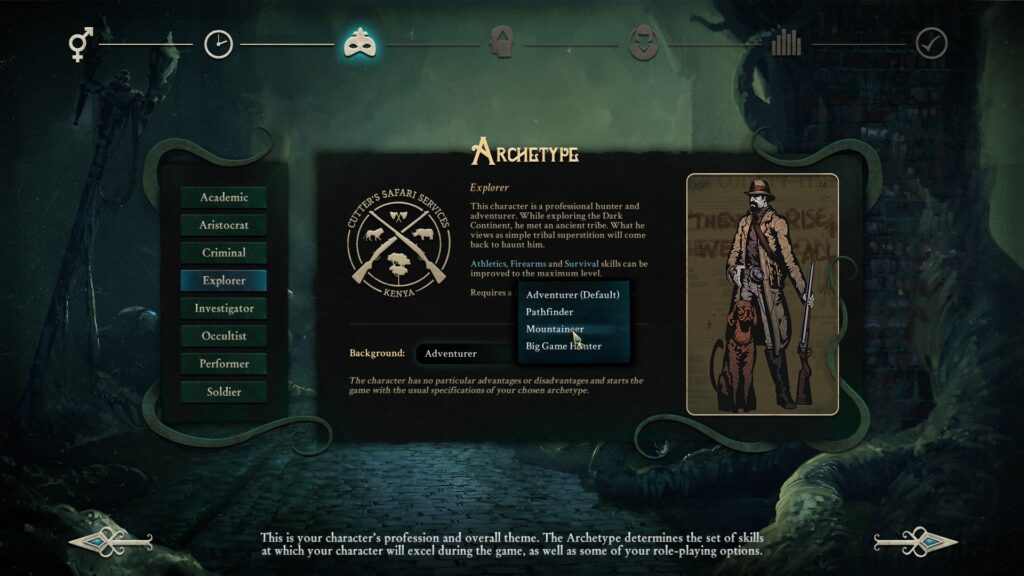
What I Dislike about Stygian: Reign of the Old Ones
In terms of story, this game is unfinished, leaving many plots, quests, and arcs with unsatisfying cliffhangers. My understanding is that Cultic Games planned to finish the game, but money ran out, and the focus shifted to an upcoming prequel. I imagine the goal is to use this new game to support a continuation. But that doesn’t change the unfinished state of Stygian: Reign of the Old Ones. The beginning and middle remain filled with content, but the final act (loosely stated) falls monstrously short.
While this unfinished state mostly affects content, I did run into game-breaking bugs. From my understanding, these bugs completely hinder progress. Most are avoidable, but some are unlucky draws.
It’s these points that make this a challenge to recommend, requiring the potential player’s careful consideration.
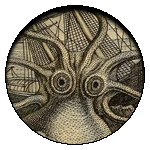
Final Thoughts
Stygian: Reign of the Old Ones accomplishes what many games fail, bringing to life the Lovecraftian. Unfortunately, this game falls short at the end and leaves game-breaking bugs as potential deterrents for full enjoyment. If what you read above entices you, it may be worth the investment. However, it’s unfair to recommend this game within its compromised state.
Gaming
Ashen (2018), a Game Review
Ashen (2018) is a souls-like action RPG developed by A44 and published by Annapurna Interactive available across all platforms.
Published
3 months agoon
April 30, 2024
Ashen (2018) is a souls-like action RPG game developed by A44 and published by Annapurna Interactive. This game provides a single-player and multiplayer experience with passive multiplayer mechanics. For this review, I am discussing the 39.99 Steam release, but it’s also available in the Epic Game Store, Xbox, Nintendo Switch, and PlayStation.
In this bitter world, your character seeks to make a home for yourself and others. This goal requires you to fight for every inch of land, building connections and alliances to maintain a thriving village. Venture further to make the world a more hospitable place, but know the further you travel, the greater the threats.
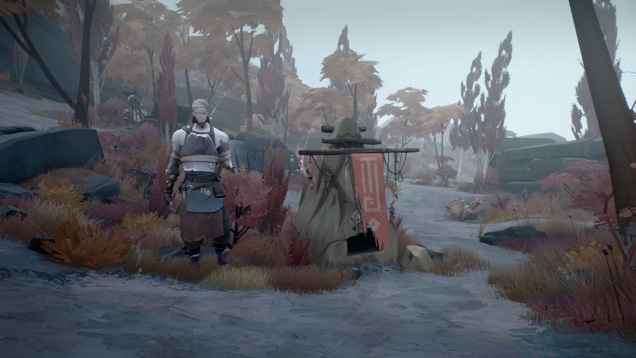
What I Like about Ashen
In 2017, Ashen earned a nomination for the Game Critics Awards’ “Best Independent Game.” It would later earn several more nominations in 2019. At the National Academy of Video Game Trade Reviewers Awards, it received nominations for “Game, Original Role Playing” and “Original Light Mix Score, New IP.” It was nominated for “Most Promising New Intellectual Property” at the SXSW Gaming Awards. Finally, at the Golden Joystick Awards, it earned a nomination for “Xbox Game of the Year.”
The multiplayer experience remains essential for Ashen, focusing on you and a partner venturing together to explore an open-world environment. However, the single-player experience is my focus and the game accounts for this gameplay. Ashen often pairs you with a villager who helps with the challenges.
The art style remains a plus throughout the gameplay. Though muted in colors and lacking finer details, the style creates a unique world that allows players to get lost along their journey. If the aesthetic doesn’t evoke that curiosity, then Ashen becomes hard to recommend.
Vagrant’s Rest and the inhabitants remain a strong incentive to continue on your journey. Seeing the progression of the town and building connections with the people provide the most rewarding experience.
In terms of horror, the art style often evokes an eerie atmosphere. However, I won’t go so far as to say the game is haunting. Instead, it evokes emotions that can unsettle and unnerve the gamer.

Thoughts and Considerations
The souls-like influence remains straightforward. Progression requires the player to defeat enemies and collect currency for weapons or certain item upgrades. Ashen simplifies and focuses its gameplay, reducing variety to polish its choices. The gameplay remains fluid, with a few hiccups that might be a computer issue.
If you prefer magic or defined classes, the gameplay doesn’t enable this variety. Item upgrades and choices define your playstyle, allowing most items to be playable at any stage of gameplay.
Weapons make a greater difference in playstyle. Most of these differences are self-evident (i.e. blunt weapons are slower but stun), but upgrades make any weapon viable. You pick an aesthetic and function, sticking with it until something better catches your eye.
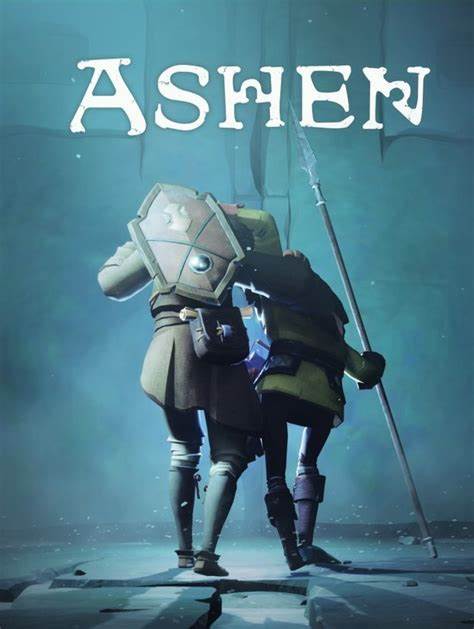
What I Dislike about Ashen
As mentioned, the game had some technical issues. I often assume this to be my computer, but I did note a few others mentioning similar issues. The gameplay remains fluid, so take this comment as a small point of consideration.
With limited roleplay options, liking the characters or art style remains essential for your time and money investment. As mentioned, the game doesn’t hold the variety of FromSoftware, which means their selling point comes from that unique art style and world.
Passive multiplayer is a major part of the marketing for Ashen. While I don’t mind this mechanic, 6 years after release reduces the overall impact. When so few wanderers appear in your game, it’s hard to see the overall appeal.

Final Thoughts
Ashen delivers a highly specialized souls-like experience, preferring to perfect what it can at the cost of variety. If the art appeals and the thirst for a souls-like has you wanting, Ashen stands as a strong contender. However, there are many contenders which make this hard to overtly recommend.
Gaming
I Have No Mouth, and I Must Scream (1995), a Game Review
I Have No Mouth, and I Must Scream (1995) is a point-and-click horror game based on Harlan Ellison’s award-winning short story.
Published
3 months agoon
April 29, 2024
I Have No Mouth, and I Must Scream (1995) is a point-and-click horror game based on Harlan Ellison’s award-winning short story of the same name. Developed by Cyberdreams and The Dreamers Guild, this adaptation brings a new perspective to a familiar story. I heard of free purchasing opportunities for this game but cannot verify the quality. For this review, I played the 5.99 Steam release.
Play as one of the remaining humans on earth: Gorrister, Benny, Ellen, Nimdok, and Ted. Each faces a unique challenge from their common torturer, the AI supercomputer known as AM. Chosen by AM to endure torment, these challenges require the participants to face their greatest failures and tragedies.
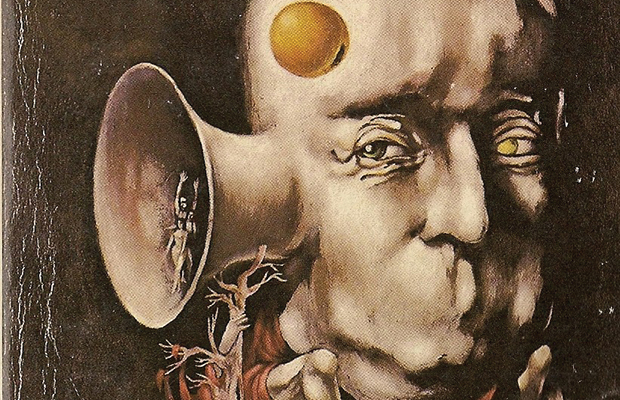
What I like about I Have No Mouth, and I Must Scream
Having experienced this story a few times, Harlan Ellison provides the most substantive execution of his vision and moral questions in this game. While all have individual merits, I assume the added content and context better dive into the relevant points he hoped to explore. He also played the voice of AM, giving us the emotional complexity of the machine as he saw it.
As the above comment indicates, I Have No Mouth, and I Must Scream remains a faithful adaptation with only one notable change. While that one change does reflect in that character’s journey, it uses that opportunity to the fullest. Where the short story left room for potentially inaccurate interpretations of the characters, this added context makes us better understand them.
The game’s writing remains a selling point for this story-driven experience. It dives further into the lore of the human characters and even allows further development of AM in the process. There are many ways to progress, and the multiple characters allow gamers to adventure further if stuck. That said, progressing individual characters to complete their journey remains essential for the true ending and experience.
As a point-and-click game made in 1995, I Have No Mouth, and I Must Scream holds up well. In many ways, it pushed the genre in its time with dynamic storytelling and game features. Harlan Ellison was someone who pushed boundaries to challenge himself and others. He saw the gaming industry as another opportunity to evoke story-driven art, a focus reflected here.

Thoughts, Triggers, and Considerations
I Have No Mouth, and I Must Scream adapts a dark and bleak story from an author notorious for his dark material. This game is no exception to that standard. Mental illness, sexual assault, genocide, and torture envelop the game. These elements are handled with attention but remain triggering to those sensitive to such dark material.
If these are deal breakers, I Have No Mouth, and I Must Scream will likely earn a skip.
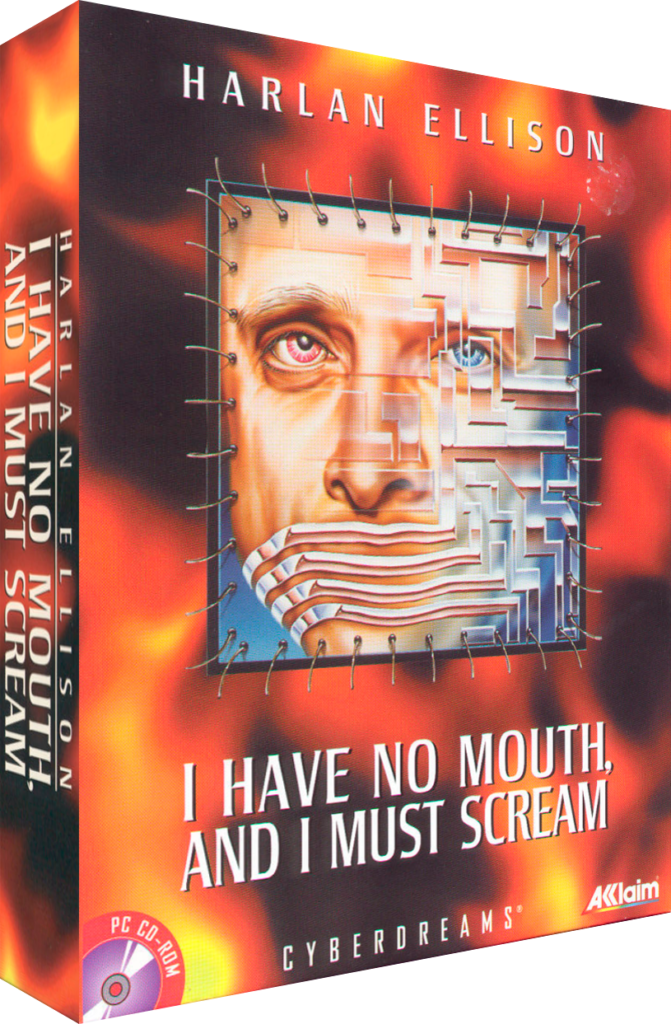
What I Dislike, or Considerations, for I Have No Mouth, and I Must Scream
While the short story remains a haunting example of fiction in every sentence, I Have No Mouth, and I Must Scream doesn’t evoke the same tension. It allows room to breathe or refocus on another character, which reduces the horror such a story evokes. While the characters participate in their torment, the loss of agency and hopelessness doesn’t translate in the execution.
Some mechanical and gameplay issues are noteworthy. For example, the saving mechanic remains dated, piling up if you save often or for specific reasons. Most of the mechanical issues stem from outdated UI from a gamer of a more modern era. Play it long enough, and elements start to click, but it needs that user investment.
Point-and-click caters to a niche audience, so modern gaming audiences aren’t inherently the demographic. The puzzle-solving and gameplay won’t win you over if the genre isn’t to your taste. Even within the genre, many of the puzzles remain challenging. For fans of the genre, this likely earns a positive merit. For those looking to continue the short story, this challenge will prove an obstacle.

Final Thoughts
I Have No Mouth, and I Must Scream provides a new opportunity for the award-winning story to reach new audiences and continue to grow. Not satisfied with repeating his story in a new medium, Harlan Ellison expands this bleak world through the point-and-click game. While not as haunting as the short story, this game provides the most context and development of any adaptation before it.


